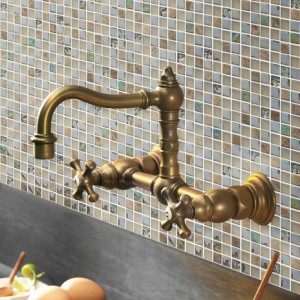Ceramic Tile Countertop Review
Common tile materials include ceramic tiles made from pressed clays, porcelain tiles which are generally thicker and have the color throughout the tile and not just on the surface, and natural stone tiles (granite, marble, slate, limestone, etc.). Tile countertops are installed on top of plywood with a mortar bed or cement board. Grout is then attached to the sub-top and grout is applied between the tiles.
Tile backsplashes are the hot new trend. Because of the lighter use, the tile grout stays nice looking for a long time. There is a wide range colors, patterns and textures to compliment any counter surface.
There are many benefits to a tile countertop in both residential and commercial settings. Ceramic tiles can withstand heat from hot pots and pans, they are scratch resistant and come in a wide variety of sizes, shapes, colors and patterns. Glazed ceramic or porcelain tiles are also impervious to water. Natural stone tiles such as granite or marble, are also heat resistant, scratch resistant and are available in a wide variety of colors and sizes.
One of the biggest drawbacks to a ceramic tile countertop is the grout. Grout can be tinted to match or contrast the tile countertops. However, lighter colored grouts do have a tendency to show dirt more than darker colored grouts. Most tile professionals recommend that grout be sealed so as not to harbor bacterial growth. Sealing the grout also prevents water seeping down in between the tiles which can eventually lead to the break down of the grout and ultimately water damage to the sub top and even cabinets underneath. Natural stone tiles should also be sealed along with the grout in order to help prevent stains, odors and bacterial growth.
Generally speaking ceramic tile countertops are difficult to repair. Although damaged tiles can be replaced, if a dye lot is not matched the repair can become very obvious. If tile grout becomes warn or damaged, it is possible to regrout a tile countertop. However tiles can become damaged during the regrouting process.
Ceramic Tile Manufacturers:
- Vary greatly by area. Most important to find a quality tile setter.
PROS – Lower cost, huge color, pattern and texture selection, stain and scratch resistant, Do-it-yourself a real possibility.
CONS – Grout can be very difficult to clean, uneven surface can be difficult to clean, gout should be sealed periodically.
CARE & CLEANING – For ceramic tile, use a rag with an all purpose cleaner. You may have to periodically seal the grout. If you have granite tiles, see granite care and cleaning section.
WARRANTY – Typically there is no extended warranty with tile. Larger manufacturers will warrant the material before it is installed. Find a tile installer that will warrant the craftsmanship for a minimum of one year.
COST – Due to the wide variety of tiles available prices can range from very reasonable for standard solid colored ceramic tiles to extremely costly for hand crafted or specialty tiles. However, on average, you can expect to spend $12 – $40 square foot for tile materials and installation.

